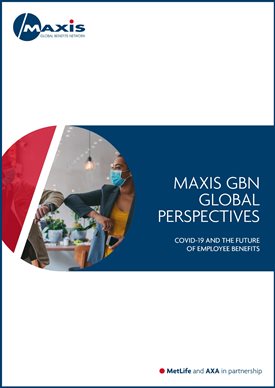NEWS
Tuesday 1 December 2020
 A third of professionals (33%) expect businesses to prioritise health over lifestyle employee benefits as a direct consequence of COVID-19, according to our new research. In addition, just over a fifth (21%) want greater access to wellness and wellbeing solutions in the wake of the pandemic and its impact on mental health, chronic diseases and access to healthcare.
A third of professionals (33%) expect businesses to prioritise health over lifestyle employee benefits as a direct consequence of COVID-19, according to our new research. In addition, just over a fifth (21%) want greater access to wellness and wellbeing solutions in the wake of the pandemic and its impact on mental health, chronic diseases and access to healthcare.
Workers in Hong Kong and Australia recorded the highest support (44%) for businesses prioritising health over lifestyle benefits. Hong Kong also saw the most backing for greater access to wellness and wellbeing solutions followed by the UK at 31%.
The research we commissioned during the summer of 2020 among senior executives and employees based in 10 countries – including the UK, Australia, UAE, Germany, US and Brazil – showed the significant impact that COVID-19 is expected to play in the evolution of the global employee benefits market.
Download our new report to find out more
Almost half (46%) of respondents said the pandemic had made them reappraise the value of employee benefits when deciding to stay with or join a new employer, showing that employee benefits are still a crucial part of an employee’s total reward package and are vital for attracting and retaining workers. That number rose to 59% in the UAE and 58% in South Africa.
The study found that one in seven (15%) expect to see an overall increase in the benefits being offered post-COVID while 10% said that the crisis had exposed a lack of suitable benefits from their employer.
Communication of benefits was an issue for nearly a fifth (18%), who said their employer failed to keep them informed about relevant benefits during the crisis. In the UK, a third (33%) said communication had been lacking.
Mattieu Rouot, CEO at MAXIS GBN said: “Health and wellness solutions were a part of many employee benefits programmes well before the pandemic, but the crisis has meant that a health and wellness offering can no longer be a ‘nice to have’. It is vital for attracting and retaining employees. Many employers had programmes in place which have now truly demonstrated their value in protecting and caring for their employees this year.
“For those who didn’t offer these benefits and want to, or for those for who did and want to offer more, there is now an opportunity to find new ways to meet the demand. For example, innovative digital wellness solutions have been in high demand and use throughout the crisis and for many will become an integral part of their employee benefits programmes.”
The new research also found strong support for the concept of portable benefits, where multiple employers can contribute to an individual’s employee benefits, wherever they are working – a real advantage for gig economy workers. Just over half (51%) of those surveyed said they would support the idea, rising to 56% in the UK, 60% in South Africa and as much as two thirds (66%) of respondents in Hong Kong.
Mattieu Rouot, continued: “Innovation is integral to the employee benefits sector, and we expect the COVID-19 crisis to turbo-charge the trends towards digital innovation that we were seeing before the pandemic.
“Globally, employees have been asking for more flexibility in their benefits for some time. Employers need to create programmes that work for individuals as benefits that are appropriate in one country won’t necessarily be so in another. Also, benefits that are attractive to older workers will not necessarily engage younger employees. We believe the pandemic will increase this need and that a ‘one size fits all’ benefits model no longer works for employees that are looking for relevant, sophisticated and suitable benefits.”
Download the full report